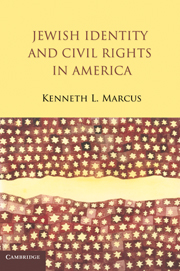Book contents
- Frontmatter
- Contents
- Acknowledgments
- Introduction
- 1 The Dilemma of Jewish Difference
- 2 The Jewish Question in Civil Rights Enforcement
- 3 The New Campus Anti-Semitism
- 4 Criticism
- 5 First Amendment Issues
- 6 Misunderstanding Jews and Jew Hatred
- 7 Institutional Resistance
- 8 The Originalist Approach
- 9 Scientific Theories
- 10 Social Perception
- 11 The Subjective Approach
- 12 Anti-Semitism as Harm to Racial Identity
- Conclusion
- Index
- References
6 - Misunderstanding Jews and Jew Hatred
Published online by Cambridge University Press: 05 June 2012
- Frontmatter
- Contents
- Acknowledgments
- Introduction
- 1 The Dilemma of Jewish Difference
- 2 The Jewish Question in Civil Rights Enforcement
- 3 The New Campus Anti-Semitism
- 4 Criticism
- 5 First Amendment Issues
- 6 Misunderstanding Jews and Jew Hatred
- 7 Institutional Resistance
- 8 The Originalist Approach
- 9 Scientific Theories
- 10 Social Perception
- 11 The Subjective Approach
- 12 Anti-Semitism as Harm to Racial Identity
- Conclusion
- Index
- References
Summary
Beyond playing the First Amendment card, the University of California at Irvine publicly responded to the Zionist Organization of America’s (ZOA’s) complaint with a frontal assault on the 2004 Department of Education Office of Civil Rights (OCR) policy, flatly insisting that “Title VI does not apply to allegations of anti-Semitism.” UC-Irvine administrators reasoned that “religion is not a protected class for purposes of Title VI.” Additionally, the school argued that Shaare Tefila held that “Jewish” constitutes a “race” only for purposes of § 1982. The Court “specifically rested its holding on the fact that when the Civil Rights Act of 1866, of which § 1982 is a part, was enacted, ‘Jews … were among the peoples then considered to be distinct races and hence within the protection of the statute.’” By 1964, Irvine notes, “race theory had developed dramatically,” and Jews were no longer considered a race. Moreover, Irvine argued that Congress’s inclusion of religion in Title VII of the 1964 Act “indicates that had Congress desired to also make religion a protected class under Title VI, it knew that it needed to do so specifically.” Irvine also denies that it has discriminated against any student.
ZOA responded that Jews are a protected class under Title VI as both a religious minority and a national origin group. ZOA conceded that the term “religion” “is not expressly included in the language of Title VI” but nevertheless argued that “the legislative history of the statute suggests that Congress intended that religious discrimination be included.” In support of this counterintuitive theory, ZOA cited a substantial number of sources that include religious discrimination in a recitation of discriminatory grounds prohibited by Title VI ZOA also argued that Jews are protected under the broad interpretation that some lower courts have given to the term “national origin” (notwithstanding the narrow construction that the U.S. Supreme Court had established).
- Type
- Chapter
- Information
- Jewish Identity and Civil Rights in America , pp. 81 - 97Publisher: Cambridge University PressPrint publication year: 2010



